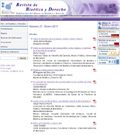A posição do ser humano no mundo e a Land Ethic
DOI:
https://doi.org/10.1344/rbd2011.23.7751Palabras clave:
land ethic, ser humano, ambiente, antropocentrismoResumen
This work aims to demonstrate how the Land Ethic, a ramification of the environmental ethics conceived by Aldo Leopold, proposes a change in the way human beings position themselves in relation to the world and everything that is non-human. Furthermore, we want to discuss the contemporary environmental crisis, expose its origins and demonstrate that one of its main causes is the position that human beings have occupied toward the world (a position of ethical and ontological superiority). We will see that its roots are profoundly connected to the western thought, especially to Francis Bacon, René Descartes, Galileu Galilei and Isaac Newton ideas. To achieve our goal we consider that ethics are the starting point to the environmental crisis resolution. Human beings have achieved, especially after the XVI century, an incredible level of interference and transformation over nature, and that action has caused an important instability in the global ecosystem. The paradigm upon which we live in today is extremely anthropocentric and brought with it a project of domination by the human being over the environment realized through technic. Using the ideas of David Hume and Charles Darwin, Aldo Leopold postulated, with the Land Ethic, a change in our ethical emphasis, from the individual to the community – human beings would be, then, a plain member, one among many others, of the biotic community. Therefore, a change in the human being position in the world, proposed by the Land Ethic, would be a necessary “ethical turning point” in the contemporary world.Descargas
Cómo citar
Possamai, F. V. (2011). A posição do ser humano no mundo e a Land Ethic. Revista De Bioética Y Derecho, (23). https://doi.org/10.1344/rbd2011.23.7751
Número
Sección
Sección General
Licencia
 Las/os autoras/es conservan los derechos de autoría de los artículos y autorizan a la Universitat de Barcelona a publicarlos en su Revista de Bioética y Derecho y a incluirlos en los servicios de indexación y abstracts, bases de datos académicas y repositorios en los que participa la revista.
Las/os autoras/es conservan los derechos de autoría de los artículos y autorizan a la Universitat de Barcelona a publicarlos en su Revista de Bioética y Derecho y a incluirlos en los servicios de indexación y abstracts, bases de datos académicas y repositorios en los que participa la revista.
Los trabajos publicados en la Revista de Bioética y Derecho están bajo la licencia Creative Commons Reconocimiento - NoComercial - SinObraDerivada 4.0 Internacional (by-nc-nd 4.0), que permite compartir la obra con terceros, siempre que éstos reconozcan su autoría, su publicación inicial en esta revista y las condiciones de la licencia. No se permite un uso comercial de la obra original ni la generación de obras derivadas.







